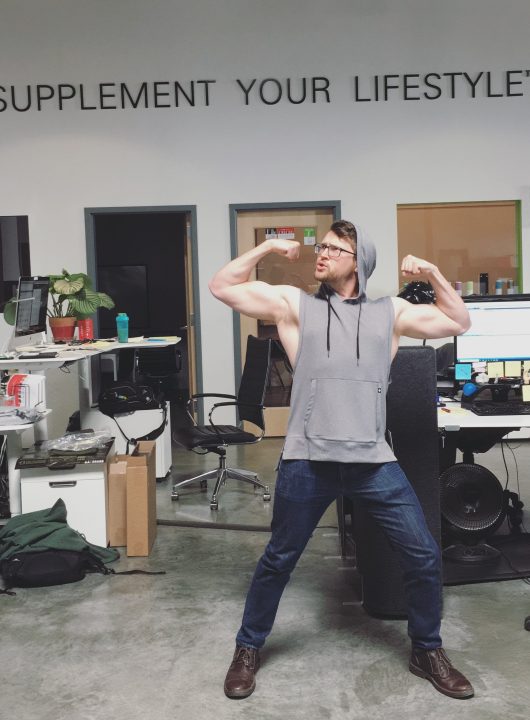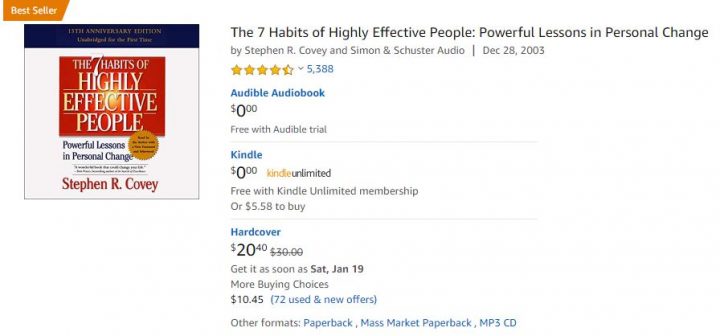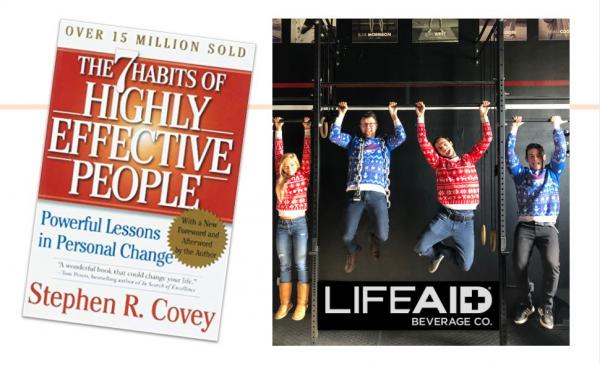A Better Way to Think Ep. 1: "The 7 Habits of Highly Effective People"
With a customer satisfaction rating of 95%, the customer service team at LIFEAID Beverage Co. must be doing something right!
Every quarter, the team of nearly half a dozen customer service team members reads a book and discusses it together — sharing their insights, questions and takeaways. Topics range from motivation, customer service, team-building, humorous life lessons, positive habits and everything in between. Inevitably, the team walks away with a better understanding of how to be the best possible version of themselves — at work and in their personal life.In this edition of A Better Way to Think, your LIFEAID customer service team bookworms Jade, Rose & Steven tackle The 7 Habits of Highly Effective People by Stephen Covey. Here's what they had to say about the book and how it changed each of their lives ...
PART 1 - Intro: PARADIGMS AND PRINCIPLES
Rose’s Takeaway: This chapter brings up how traditional literature regarding effectiveness is superficial, providing only quick fixes and social bandaids that mask chronic problems.Perceptions govern the way we see, and how we see governs how we behave. So we must change the lens through which we see the world before we can change the reality of what's on the other side of the lens.In order to achieve long-term success, you must put the work in and take no shortcuts along the way.

HABIT 1: Be Proactive
Jade’s Takeaway: "Proactivity" is defined by Covey as the following: “We have the initiative and responsibility to make things happen.” There are three “social maps” or theories of determination that are thought to influence or determine an individual's life. These are Genetic Determinism (you are the way you are because of your genes and ancestry), Psychic Determinism (your childhood and upbringing laid out your personal tendencies and character structure), Environmental Determinism (factors in your environment and surroundings are responsible for your situation). The philosopher and holocaust survivor Viktor Frankl came to a realization amidst unbelievable horrors and tragedy, saying,“Man has the freedom to choose, using self-awareness, imagination, conscience, and independent will.” Between stimulus and response is the power to choose.This means that the individual has the ability to choose how they respond to stimulus and circumstance. The ability to be “Response-able” to be proactive. Highly productive people recognize responsibility — their behavior is a product of their own conscience choices, based on values rather than a product of their circumstances. “I am not a product of my circumstances. I am a product of my decisions.” Proactive people focus on their “circle of influence,” the things that they can do something about. Reactive people focus on their “circle of concern” — focusing on the things that they have little to no control over. Gaining an awareness over the areas in which we can expand our energies is a step in becoming proactive.
“The commitments that we make to ourselves and others and our integrity to those commitments is the essence of our growth and the clearest manifestation of our proactivity”
 Rose's Takeaway: What matters most is how we respond to what we experience in life. It’s not the doing of others or even our own mistakes that hurt us, but how we react to them. The idea that the problem is out there, with others or circumstances, is the problem itself. Learn to view the weaknesses of others with compassion, not accusation. This section also touches on something I found powerful: “Love is a Verb.” Love is an action, the feeling follows.
Rose's Takeaway: What matters most is how we respond to what we experience in life. It’s not the doing of others or even our own mistakes that hurt us, but how we react to them. The idea that the problem is out there, with others or circumstances, is the problem itself. Learn to view the weaknesses of others with compassion, not accusation. This section also touches on something I found powerful: “Love is a Verb.” Love is an action, the feeling follows.
HABIT 2: Begin with the End in Mind
Steven’s Takeaway: Beginning with the end in mind ensures you don’t violate the criteria you have defined as supremely important in life. You must start with a clear understanding of your destination and know where you are going so that you better understand where you are now and the steps need to get there. In addition, this concept is based around the principle that “all things are created twice.” The first creation is leadership, carefully thinking through business endeavors. The second creation is management, the organizing of all elements to meet the objective. Effectiveness does not depend solely on how much effort we expend, but on whether or not the effort is focused in the right areas.“Management is doing things right, leadership is doing the right things.”A Personal Mission Statement is the most effective way to begin with the end in mind. We must begin in the center of the circle of influence which is composed of our most basic paradigms. The center is sourced by security (sense of worth), guidance (source of direction), wisdom (perspective on life), and power (capacity to act). When these four things are harmonized they create a great force. An effective Organizational Mission Statement is one that reflects the shared vision and values of everyone within that organization, creating unity and tremendous commitment.

HABIT 3: Put First Things First
Rose, Jade & Steven's Takeaways: Habit 3 is the fulfillment of habits 1 and 2. Habit 1 says you are the creator, it empowers you to say that is an unhealthy program I’ve been given, an ineffective script that I can change. Habit 2 is the first mental creation, based on the ability to envision. Create with our minds what we cannot presently see with our eyes. Habit 3 is the physical creation, the natural emergence of habits 1 and 2. The Power of Independent Wealth: Manage from the left, lead with the right. Effective management is putting first things first. While leadership decides what the first things are, management is the discipline to carry things out. Discipline is a function of independent will, it comes from within. Time = Efficiency / People = Effectiveness Delegation plays a big part in effective management.“Effective people are not problem minded. They feed opportunities and starve problems” — LIFEAID core value: Be solution-oriented, not problem-focused.
HABIT 4: Think Win, Win
Steven’s Takeaway: Private victory precedes public victory. “Until we stop treating the symptoms and start treating the problem, our efforts will only bring counterproductive results.” Move away from the “quick-fix” band-aids. The Emotional Bank Account is an important concept to help establish and maintain healthy relationships with friends, colleagues, customers, etc. Rose’s Takeaway: There is no quick fix to building or repairing relationships, they are long term investments. Make deposits into people's emotional bank accounts by seeking to understand what’s important to the individual, make what's important to the other person as important to you as that person is to you. Tend to the little things, keep commitments, show personal integrity and clarify expectations to avoid miscommunication.
HABIT 5: Seek First to Understand, Then to Be Understood
Rose’s Takeaway: First diagnose, then prescribe. To interact with someone effectively, you must first understand them. If you are using some sort of technique, the person will sense duplicity and manipulation. The key to influence is is your example, if your private performance doesn’t doesn’t square up with your public performance, a person is likely to not open up to you. We typically seek first to be understood. Empathic listening is listening with intent to understand. Empathic listening is powerful because it gives you data to work this, listening in itself is a tremendous deposit into one's emotional bank account. It is deeply therapeutic and healing because it gives the person psychological air.HABIT 6: Synergize
Jade’s takeaway: Synergy is the essence of principle-centered leadership. Synergy can be defined as the whole is greater than the sum of its parts. Factors coming together to make something greater. LIFEAID is a prime example of synergy. Different departments and assets coming together to make something greater than anyone component. An example of synergistic communication at LIFEAID is the weekly department head meeting. Coming together to discuss and find ways to find win, win solutions to various roadblocks within each department, helping team members reach their goals. The same thing can be said for the weekly Customer Service meetings. An effective company needs to be synergistic. Everybody brings something to the table.HABIT 7: Sharpen the Saw & Inside-Out Again
Rose & Steven's Takeaways: Sharpening the saw. Take all the habits we’ve discussed and apply them all to your life. Covey compares training your patience to building muscle in the gym. The growth happens during those last few repetitions — when the nerve fiber registers pain, the fiber is then made stronger. If it happens to be raining on a morning you had planned to take a jog, simply think, “Oh great, this is an opportunity for me to exercise my patience and willpower as well as train.” At LIFEAID, we are constantly encourage to remain active and take care of our bodies. The four dimensions we sharpen are: physical, spiritual, mental and social/emotional. Your spiritual dimension is your core. “If ones motives are wrong, nothing can be right.” As long as you feel you are serving others, you do the job well. When you are concerned only with helping yourself, you do the job less well. Character can’t be made except by a steady continued process.“When we take the time to draw on the leadership center of our lives ... it spreads like an umbrella over everything else. It renews us, it refreshes us.”
A B O U T T H E T E A M : Rose and Steven have been valuable members of the LIFEAID customer service team since 2017. Jade has been the LIFEAID customer service team captain since 2016. Stephen R. Covey's best-selling book is available for purchase online & at local bookstores nationwide.
 > > > Live well.
> > > Live well.








